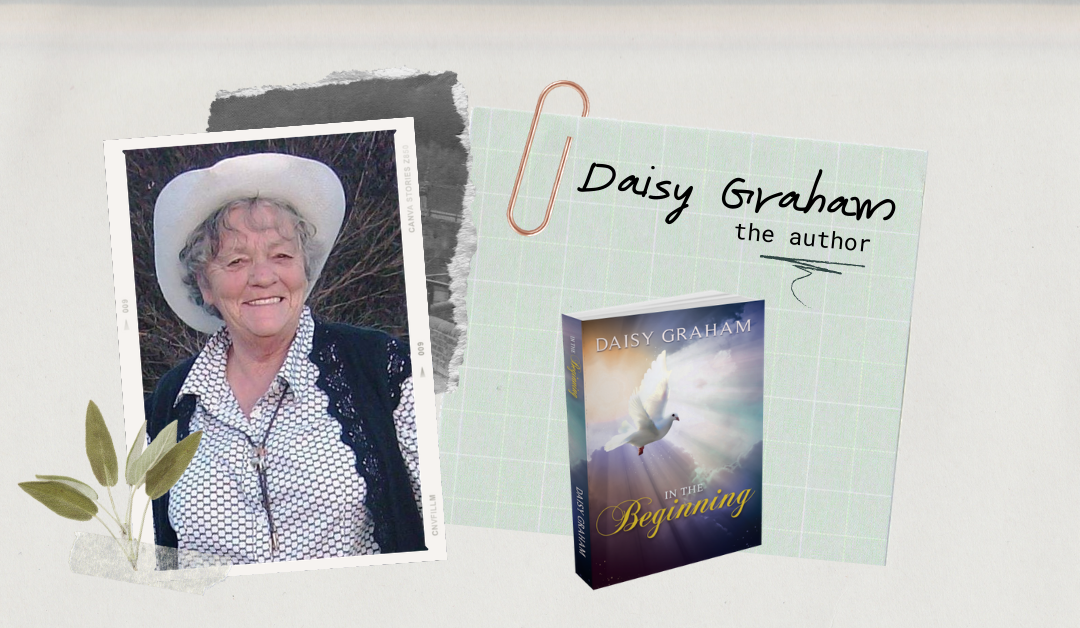Daisy Graham talks to Stampa to share her views on her fictional survivalism masterpiece In The Beginning. She combines facts from the Book of Revelations and powerful storytelling to illustrate the mysteries of faith — in God and among friends, whether in a cave fighting for your life or in overcoming life’s little and great challenges.
When Daisy Graham began writing her novel back in 1984, little did she imagine that the message of her story would be highly relevant fast forward to 2021 during the time of a pandemic. “The way the world is heading,” was one of her first words as we sat down for an interview, “I feel as though my story is coming true.”
In The Beginning is very much a Christian end-of-days story as it is survivalism. One particular faith-related book guided Daisy’s writing of the novel – that of the New Testament’s Book of Revelations – but the message that will resonate with the readers is that friends are as important as family. We learn from the book’s five main female characters a kind of friendship unbreakable and genuine as we track their fictional discoveries and misadventures after a massive earthquake traps them in a cave. The intensity of their female bond leads to bright spots of joy in an otherwise dreary setting, and their affection for each other always ends up carrying them through, especially at times when their journey seems impossible.
Faith is also a central theme in the book and just as British-Australian novelist Tobsha Learner is quoted to have said: “Faith is the food of survival,” Daisy believes we will not survive if we do not have faith in God, and this central, overwhelming conviction that human existence has intrinsic meaning that motivated her to complete her story.
Life got really busy for the then-young Daisy, who never found the time to finish In The Beginning until she retired many years later, but because she felt novelists like her are born rather than made, she set out to complete her first masterpiece as soon as she felt the inspiration coming again. She also opted to publish her work independently although thinking about it now, she’d rather advise young, aspiring writers to try to find a publisher first before thinking of publishing on their own.
While both publishing options have their pros and cons – for example, submitting to traditional publishers could feel like knocking your brain against a wall or self-publishing could nearly empty your life savings if you weren’t careful – independent publishing gives writers much more control over the process like how their book covers are designed, how their books get marketed and what type of editor they work with.
In Daisy’s case, she admits she rarely relish the meet-and-greets with her fans/readers – only because she is shy around people most of the time, especially when she has to talk about herself and her works. That’s not to say she does not appreciate her readers’ kind words about her work. On the contrary, she respects the Internet’s huge role in promoting books and driving the literary culture, in general, and would love to use it as a tool in interacting with her audience in the future.
Reserved writers like her, who have chosen to publish independently, can benefit a lot from having a team of professionals guide them on the promotion process – a publishing partner in their chosen indie path.
Take the case of another author Melissa Leong and her book What Kills Me. When she finally took advice from her friends to self-publish through Amazon’s Kindle Direct Publishing site, she initially had the price of her book set at $2.99, which didn’t sit well with the site’s readers. But when she dropped the price to $0.99, readers took notice and she shot up to Amazon’s bestseller list in the Occult and Action & Adventure categories.
Sometimes you just have to decide to jump right into it. It may take you another six months or so to learn everything about self-publishing in the most professional way possible before you release it to the world, but if you do your own marketing and PR under proper guidance, you could sell thousands of copies and make it to the bestseller list.
Afterall, just when you think it is over, God sends you a miracle.
FAST TALK WITH DAISY
Stampa: Tell us about your background. Have you always been writing?
Daisy: I wrote stories and plays when I was a child. The neighbours’ children helped me at them out and loved listening to my stories. I have never attempted or have anything published before.
S: Did you grow up in a bookish house? What was your early relationship with books?
D: Yes, we always had plenty of books in the house. I always loved reading.
S: When did you begin writing in a serious way, and what motivated that?
D: I wrote a story and left it to my Mother as she wanted to have it published, but lost track of it.
S: What do you do when you feel creatively stuck?
D: Take time off.
S: What keeps you busy when you’re not writing?
D: Volunteer work and playing Coquet.
S: How do you relax after a gruelling work day?
D: I knit for the birthing unit at the hospital.
S: Which writers do you look up to, if any, or probably books that have inspired your writing?
D: Maybe I should have written for children as most children’s writers have inspired me.
S: Should writers automatically be avid readers and why?
D: It helps to set out your story.

